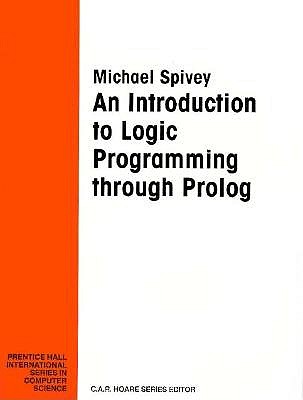
|
FreeComputerBooks.com
Links to Free Computer, Mathematics, Technical Books all over the World
|
|
- Title: An Introduction to Logic Programming Through Prolog
- Author(s) J. M. Spivey
- Publisher: Prentice Hall; 1 edition (April 1996); eBook (November 22, 2008)
- Paperback: 251 pages
- eBook: PDF (258 Page, 1.4 MB)
- Language: English
- ISBN-10: 0135360471
- ISBN-13: 978-0135360477

|
This is one of the few texts that combines three essential theses in the study of logic programming: the logic that gives logic programs their unique character: the practice of programming effectively using the logic; and the efficient implementation of logic programming on computers.
The book begins with a gentle introduction to logic programming using a number of simple examples, followed by a concise and self-contained account of the logic behind Prolog programming. This leads to a discussion of methods of writing programs so that the process of deriving anwers from them is as efficient as possible. The techniques are illustrated by practical examples and the final part of the book explains how logic programming can be implented efficiently.
It includes source code for a small but Complete Prolog implementation written in Pascal. The implementation is capable of running all the programs presented in the book, and is available via the Internet.
About the AuthorsN/A
- Prolog Programming
- Artificial Intelligence, Machine Learning, and Logic Programming
- LISP Programming Language
- Mathematical Logic - Set Theory, Model Theory, Proof Theory, Computability, etc.
- Computer and Programming Languages
 Similar Books:
Similar Books:
-
 Mathematical Aspects of Logic Programming Semantics
Mathematical Aspects of Logic Programming Semantics
This book discusses applications of Logic Programming to computational logic and potential applications to the integration of models of computation, knowledge representation and reasoning, and the Semantic Web.
-
 The Power of Prolog (Markus Triska)
The Power of Prolog (Markus Triska)
The goal of this book is to bridge the gap between the great traditional Prolog textbooks of the past and the language as it currently is. It is meant to teach Prolog as a practical programming tool and so it concentrates on using Prolog to solve interesting problems.
-
 Learn Prolog Now! (Patrick Blackburn, et al.)
Learn Prolog Now! (Patrick Blackburn, et al.)
This book has became one of the most popular introductions to the Prolog programming language, an introduction prized for its clarity and down-to-earth approach. The emphasis in this book is on using Prolog effectively.
-
 The Art of Prolog: Advanced Programming Techniques
The Art of Prolog: Advanced Programming Techniques
This book offers a departure from current books that focus on small programming examples requiring additional instruction in order to extend them to full programming projects. It shows how to design and organize moderate to large Prolog programs.
-
 Prolog for Programmers (Feliks Kluznia, et al)
Prolog for Programmers (Feliks Kluznia, et al)
This book is intended as an introduction to Prolog for people familiar with conventional programming languages. It explains in terms of programming constructs and techniques found in Pascal.
-
 Logic, Programming and Prolog, 2nd Edition (Ulf Nilsson, et al)
Logic, Programming and Prolog, 2nd Edition (Ulf Nilsson, et al)
This book introduces major new developments in a continually evolving field and includes such topics as concurrency and equational and constraint logic programming. What sets this book apart from others on logic programming is the breadth of its coverage.
-
 Prolog Programming in Depth (Michael A. Covington)
Prolog Programming in Depth (Michael A. Covington)
This book covers the Prolog programming language thoroughly with an emphasis on building practical application software, not just theory. Readers build several types of expert systems, as well as natural language processing software and utilities.
-
 Prolog Programming: A First Course (Paul Brna)
Prolog Programming: A First Course (Paul Brna)
The course for which these notes are designed is intended for undergraduate students who have some programming experience and may even have written a few programs in Prolog. The emphasis in this book is on using Prolog effectively.
-
 Prolog Experiments in Discrete Math, Logic, and Computability
Prolog Experiments in Discrete Math, Logic, and Computability
This book contains programming experiments that are designed to reinforce the learning of discrete mathematics, logic, and computability. The Prolog programming language is the tool used for the experiments in this book.
-
 Expert Systems in Prolog (Dennis Merritt)
Expert Systems in Prolog (Dennis Merritt)
For Prolog programmer interested in either building expert systems or experimenting with various expert system techniques. using a step-by-step approach to building systems, explaining the concepts and showing the Prolog code at each stage.





